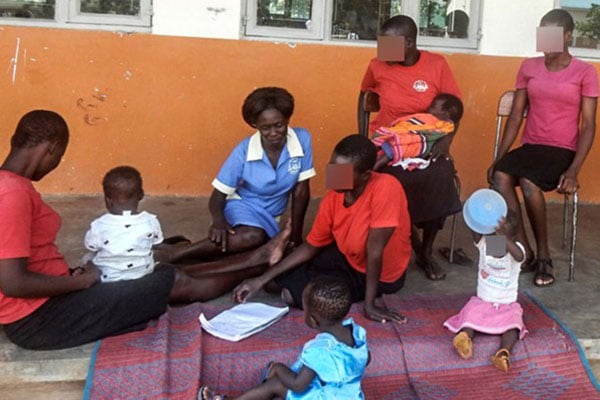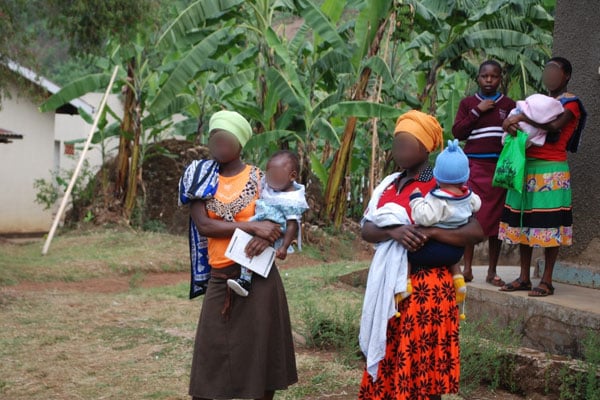Lack of sex education fuels teen pregnancies – leaders

Teen mothers attend to their children at Pader Girls’ Academy, Pader District, in 2018. Medical professionals say the biggest driver of teenage pregnancies is cultural norms, where the transition from childhood to adulthood includes marriage and giving birth. PHOTO/FILE
What you need to know:
- The 2021 statistics from the National Population Council indicate that Bukedi registered an increase in the number of teenage pregnancies from 23,829 in 2019 to 25,066 in 2020 and 33,789 in 2022.
Leaders and health officials in Bukedi sub-region have attributed the high rate of teenage pregnancies and early marriages to the lack of sex education in schools.
The 2021 statistics from the National Population Council indicate that Bukedi registered an increase in the number of teenage pregnancies from 23,829 in 2019 to 25,066 in 2020 and 33,789 in 2022.
Statistics by Uganda Bureau of Statistics (Ubos) which were released in 2022, revealed that 25.8 percent of girls get pregnant before the age of 18 and more than 180 teenagers deliver babies every month in Budaka, Pallisa, Butaleja, Kibuku and Butebo districts which make up Bukedi Sub-region.
In an interview with the Monitor last Thursday, Dr John Wogabaga, the officer-in-charge of Budaka Health Centre IV, blamed this on the lack of sexuality education in schools, which he said can empower girls to make the right decision as far as reproductive health is concerned.
He added some girls do not know how to access contraceptives, while others are under “pressure to prove their fertility”.
“About 85 percent of births of girls aged 15 to 19, occur within early marriage and yet child marriage is a negative social cultural practice, which is responsible for high maternal and infant mortality rates,” Dr Wogabaga, said.
Dr Betty Kyandondo, the director of Family Health National Population Council, said increasing access to sexual education could curb teenage pregnancies.
“Teenage pregnancy is a serious problem in Uganda and it requires the collective action of all actors to address it, especially through sexual education.”
Mr Sam Wojega, a senior clinician in Budaka District, said sexuality education provides information about sex and sexuality and enhances self-esteem and physical and emotional wellbeing of girls.
“It empowers young people to form positive attitudes about identity, relationships and intimacy,” he said.
He, however, said many girls face sexual harassment at school, home, in the communities because of lack of sexual education.
“This makes them face many sexual and reproductive health challenges without understanding them,” he said.
The Budaka District Health Officer, Dr Elisa Mulwani, said although parents may be trying to give basic sexual information to their children, they are limited by cultural barriers and a lack of appropriate knowledge.
“It is still critical to institutionalise sexuality education, and ensure that young people across Uganda access timely and accurate reproductive health information,” he said.
He noted that many parents in the Bukedi Sub-region want the government to reconsider disseminating Sexual and Reproductive Health messages through schools.
Mr Christopher Wamika, the district education officer for Kibuku, said due to the lack of sex education in schools, children engage in sex at an early stage of their lives.
“Our children are getting pregnant as early as 12 years and this is perpetrating poverty,” he said.
Statistics released by Budaka District last year indicate that at least 1,833 girls, mostly pupils, were impregnated and some married off in the three years of Covid-19.
However, some members of the public are skeptical about sexual education, saying it could lead children into sexual immorality and sexualise the children.
Rev James Wamono, the parish priest of St Stephen Church of Uganda, said teaching sexuality education in schools will accelerate immorality among the children.
“Most of the children are ignorant and don’t understand the issues related to sexuality and once you begin to teach them, you make them aware and they will love to try it. Let us let the sleeping dogs lie,” Rev Wamono, said.
Ms Elizabeth Nankoma, a cultural leader and marriage councillor in Budaka, said sex is a sacred act and teaching it to young people is not relevant.
“It would be culturally wrong for a male teacher to tell children about sexuality. Our children at this level are too young for sexuality education,” Ms Nankoma, said.
Dr Lawrence Oonyu, a health officer in Butebo District, said many children have fallen victim to sexual abuse in their early years of life and that there is need to mitigate it.
“They have not been in a position to speak out because they lack information on sexuality and confidence,” he said.
Issue
A report on pregnancy and childbirth 2019 by Biomedic Central Medicine (BMC) revealed that peer pressure, sexual abuse, lack of control over sex and lack of awareness were significantly associated with teenage pregnancy in many schools across the country.




